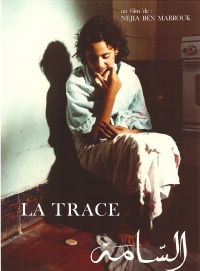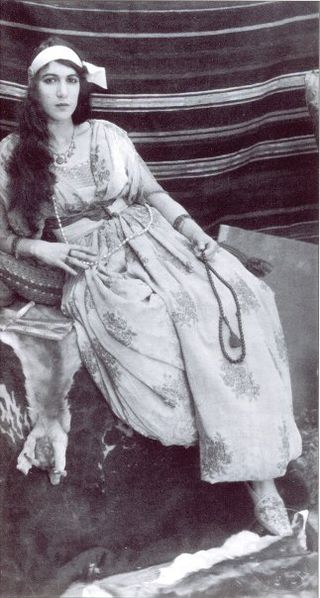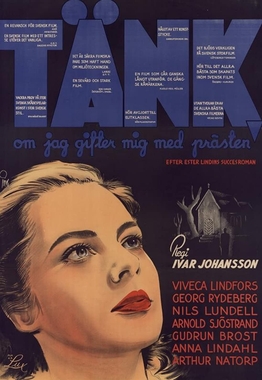Related Research Articles

Amina Rizk was a classic Egyptian actress who appeared in around 208 artworks including more than 70 movies between 1928 and 1996. She was calm in her later years, but described as a clown when she was young.

Alien from L.A. is a 1988 science fiction film directed by Albert Pyun and starring Kathy Ireland as a young woman who visits the underground civilization of Atlantis. The film was featured on Mystery Science Theater 3000. This film is loosely based on Jules Verne's 1864 novel Journey to the Center of the Earth with some minor allusions to The Wizard of Oz.

Sama is a 1988 Tunisian feature film directed by Néjia Ben Mabrouk. It is the first fictional feature film directed by a woman that was released in Tunisia. The film deals with themes of gender and education.

Anna Karenina is a 1920 German silent historical film, directed by Frederic Zelnik and starring Lya Mara, Johannes Riemann, and Heinrich Peer. It is an adaptation of Leo Tolstoy's 1877 novel Anna Karenina. It premiered at the Marmorhaus in Berlin.

Haydée Samama Chikly Tamzali was a Tunisian actress, writer, and filmmaker.
Jule Britt Selbo is an American screenwriter, playwright, author, producer and professor. She was born in Fargo, North Dakota. She is currently a professor in the Cinema and Television Arts Department at California State University, Fullerton and is a member of the WGA.

Bahiga Hafez was an Egyptian screenwriter, composer, director, editor, producer and actress.

Yoko Mizuki was a Japanese screenwriter. Born in Tokyo, she later graduated from Bunka Gakuin and began writing screenplays to support her family after her father died. Mizuki was active in the 1950s era of the Japanese studio system and is notable for her work with directors Tadashi Imai and Mikio Naruse. Her work had received several Best Screenplay Awards from Kinema Junpo and has been described in the book Women Screenwriters: An International Guide as "One of the most important and accomplished Japanese female screenwriters of all time".
Nadia Hamza is an Egyptian film director, producer and screenwriter. Before directing, Hamza worked as a scriptwriter, assistant and producer. She became a successful director and screenwriter known for making films with female leads discussing women aspirations and experiences. In 1994 she founded her own production company, Seven Stars Studio and began collaborating with other Egyptian filmmakers. Nadia believes that women director's differ from their male counterpart in regards to the subject of a film and how they handle and use the camera. She was known for portraying women and challenges societal views on working women. She has her female character's be portrayed as winners and concentrates on women's issues, especially working women.
Ingrid Sinclair is a director, screenwriter and producer best known for being an important filmmaker of the African Renaissance. She is internationally recognized for her 1996 film, Flame, a drama about the Zimbabwe War of Liberation and her documentaries about Zimbabwe. Flame was chosen for the Director's Fortnight section at the Cannes Film Festival and the Nestor Almendros Award at the Human Rights Watch International Film Festival in New York City.
The Cinema of Namibia refers to cinema in the country of Namibia, which claimed its independence from South Africa in 1990.

Tjiraa is a 2012 Namibian short drama film, directed by Krischka Stoffels. The screenplay was written by Toucy Tjijambo. The movie is almost entirely in Otjiherero, one of the indigenous Namibian languages.
Amina Mohamed (1908–1985) was an Egyptian dancer, actress and film director.

Helena Nogueira is a South African film director, "the first woman to direct a feature film in South Africa".
Oshosheni Hiveluah was a Namibian writer, producer, and director. She is best known for the films Tjitji the Himba Girl and 100 Bucks.

Culture in Namibia is a blend of many different people and its culture and customs have absorbed both African and European elements and fused them into a blend of the two. Although the country is urbanising rapidly, a majority of Namibians still live in rural areas and lead largely impoverished lives. It is among these people, however, that cultural tradition survive most strongly.
Cecil Moller is a Namibian film director and producer.
100 Bucks is a 2012 Namibian short film directed by Oshosheni Hiveluah and co–produced by Cecil Moller and Mutaleni Nadimi. The film focused an urban story of the journey of a 100-Namibia Dollar-note that passes from hands of wealth to hands of need and through thieving hands.

If I Could Marry the Minister is a 1941 Swedish romantic drama film directed by Ivar Johansson and starring Viveca Lindfors, Georg Rydeberg, Arnold Sjöstrand. with screenplay by Ester Lindin and Ivar Johansson. The film's sets were designed by the art director Bertil Duroj.

Ibn El-balad is a 1942 Egyptian film, directed by Stephan Rosti and starring Mahmoud Zulfikar and Aziza Amir.
References
- ↑ Arevalo, Rica (13 March 2010). Producer notes great strides of women in cinema, Philippine Daily Inquirer
- ↑ "Pickering, Bridget | African Film Festival, Inc" . Retrieved 4 December 2024.
- 1 2 McCluskey, Audrey T. The devil you dance with: film culture in the new South Africa (2009) ( ISBN 978-0252075742)
- ↑ Jule Selbo (2015). Jill Nelmes; Jule Selbo (eds.). Women Screenwriters: An International Guide. Springer. p. 29. ISBN 978-1-137-31237-2.